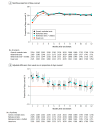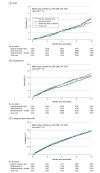Personalized Patient Data and Behavioral Nudges to Improve Adherence to Chronic Cardiovascular Medications: A Randomized Pragmatic Trial
- PMID: 39621340
- PMCID: PMC11612915
- DOI: 10.1001/jama.2024.21739
Personalized Patient Data and Behavioral Nudges to Improve Adherence to Chronic Cardiovascular Medications: A Randomized Pragmatic Trial
Abstract
Importance: Poor medication adherence is common. Text messaging is increasingly used to change patient behavior but often not rigorously tested.
Objective: To compare different types of text messaging strategies with usual care to improve medication refill adherence among patients nonadherent to cardiovascular medications.
Design, setting, and participants: Patient-level randomized pragmatic trial between October 2019 to April 2022 at 3 US health care systems, with last follow-up date of April 11, 2023. Adult (18 to <90 years) patients were eligible based on diagnosis of 1 or more cardiovascular condition(s) and prescribed medication to treat the condition. Patients who did not opt out and had a 7-day refill gap were randomized to 1 of 4 study groups.
Intervention(s): Generic text message refill reminders (generic reminder); behavioral nudge text refill reminders (behavioral nudge); behavioral nudge text refill reminders plus a fixed-message chatbot (behavioral nudge + chatbot); usual care.
Main outcomes and measures: Primary outcome was refill adherence based on pharmacy data using proportion of days covered at 12 months. Secondary outcomes were clinical events of emergency department visits, hospitalizations, and mortality.
Results: Among 9501 enrolled patients, baseline characteristics across the 4 groups were comparable (mean age, 60 years; 47% female [n = 4351]; 16% Black [n = 1517]; 49% Hispanic [n = 4564]). At 12 months, the mean proportion of days covered was 62.0% for generic reminder, 62.3% for behavioral nudge, 63.0% for behavioral nudge + chatbot, and 60.6% for usual care (P = .06). In adjusted analysis, when compared with usual care, mean proportion of days covered was 2.2 percentage points (95% CI, 0.3-4.2; P = .02) higher for generic reminder, 2.0 percentage points (95% CI, 0.1-3.9; P = .04) higher for behavioral nudge, and 2.3 percentage points (95%, 0.4-4.2; P = .02) higher for behavioral nudge + chatbot, none of which were statistically significant after multiple comparisons correction. There were no differences in clinical events between study groups.
Conclusions and relevance: Text message reminders targeting patients who delay refilling their cardiovascular medications did not improve medication adherence based on pharmacy refill data or reduce clinical events at 12 months. Poor medication adherence may be due to multiple factors. Future interventions may need to be designed to address the multiple factors influencing adherence.
Trial registration: ClinicalTrials.gov Identifier: NCT03973931.
Conflict of interest statement
Figures



References
Publication types
MeSH terms
Substances
Associated data
Grants and funding
LinkOut - more resources
Full Text Sources
Medical
Miscellaneous

